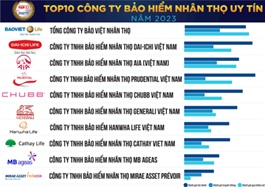Data protection heads digital banking efforts
Data protection heads digital banking efforts
Vietnamese authorities have been busy at work dismantling an illicit information network involving bank employees, as local lenders prioritise data protection and digital infrastructure for customer privacy and growth.

Danang authorities last week achieved a significant breakthrough by breaking up the activities of one illicit network involved in the unauthorised trading of banking information, aided by numerous employees.
Dao Minh Tu, Deputy Governor of the State Bank of Vietnam (SBV), last week stressed the urgency of swiftly identifying and terminating the employment of any personnel found guilty of selling customer information for any means.
“Such behaviour is deemed utterly unacceptable, and immediate action must be taken by the implicated banks to address this disconcerting issue,” he noted.
According to Danang Department of Public Security’s e-portal, its Cybersecurity Division and High-Tech Crime Prevention Division has employed diligent monitoring and technical surveillance in cyberspace to detect a group of individuals posting articles on popular social media platforms like Facebook, Telegram, and Zalo.
The posts revolved around the illicit acquisition and verification of personal customer information across over 20 national banking systems, with the aim of unlawfully profiting through
service fees.
Particularly alarming were cases where bank employees engaged in extensive exchanges and sale of banking information, involving over 20 accounts.
“Multiple employees from various banks have been implicated, including those from MSB and Sacombank. Law enforcement authorities are taking action to address this serious breach of customer privacy and to ensure the proper handling of the case,” he added.
In addition, bank employees, including those from TPBank and BIDV, along with non-bank individuals, engaged in unauthorised collection and sale of banking information to the suspect, driven by personal gain.
Further investigations in the country revealed the involvement of an employee at SeABank’s Danang Branch. The employee received profiles of 27 individuals, including altered images of both sides of their identity card, photos of their cards, and specimen signatures.
The implicated bank employee confessed to bypassing proper procedures, signing customers’ names on the account opening documents, and receiving nearly VND2.4 billion ($100,000).
“This case marks the first successful crackdown on a large-scale illegal operation involving the unauthorised trading of personal banking information in Danang and nationwide,” Tam said.
“It significantly contributes to safeguarding the integrity of personal data, preventing data breaches, and protecting the rights and interests of individuals and organisations. Notably, this achievement carries even greater significance ahead of the effective date of a government decree on personal data protection, scheduled for July 1.”
Data privacy is a paramount concern for banks and financial services that recognise the need to safeguard customer information. Consequently, Vietnam’s banks are allocating increased budgets to invest in robust digital infrastructure and data protection measures.
SBV data reveals that the banking sector invested over $625 million in digital transformation initiatives by the end of 2022. Over the past four years, Vietnam has consistently maintained a 40 per cent growth rate in digital payments, solidifying its position as one of the fastest-growing adopters of digital banking applications in the region.
The rapid and expansive nature of digital transformation in recent years, coupled with intensified technological investments, has been unanimously hailed as the primary impetus driving the sector’s future growth.
A survey by Vietnam Report last week confirmed that all Vietnamese banks recognise the profound impact of digital transformation on their profitability and operational efficiency.
“A significant 71.4 per cent of banks attribute their strong business performance to digitalisation, while the remaining 28.6 per cent acknowledge substantial benefits resulting from their digital conversion efforts over the past year,” the report said.
“Among the various tech evaluated, cloud computing emerged as the most closely correlated technology with operational effectiveness, receiving an impressive rating of 4.4 out of 5 from these businesses.”
























